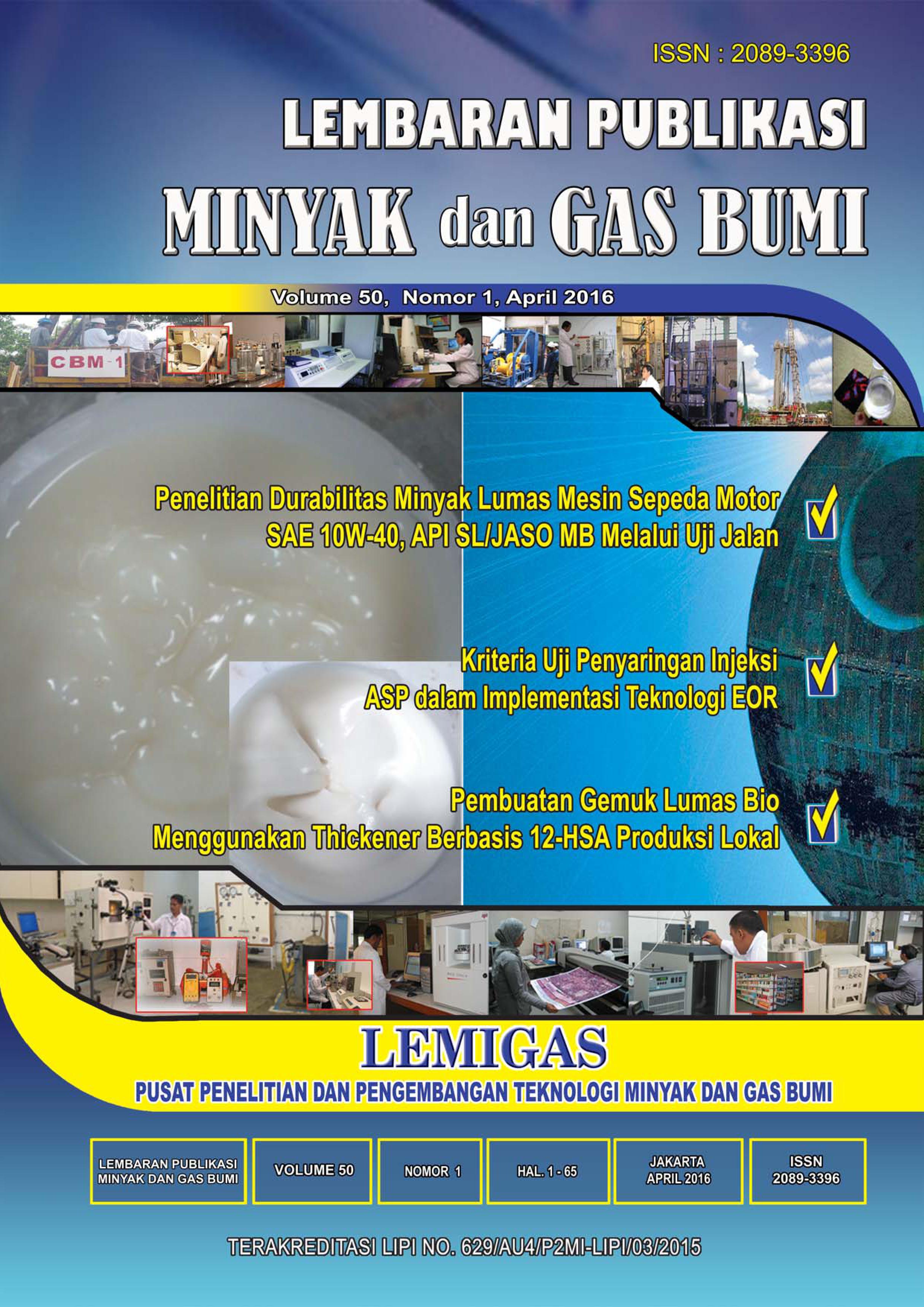Penelitian Durabilitas Minyak Lumas Mesin Sepeda Motor Sae 10w-40, Api Sl/Jaso Mb Melalui Uji Jalan
DOI:
https://doi.org/10.29017/LPMGB.50.1.299Kata Kunci:
minyak lumas, sepeda motor, uji jalanAbstrak
Penggunaan minyak lumas yang tepat akan berpengaruh pada kinerja mesin yang baik, sehingga masa pakai mesin kendaraan lebih lama dan meningkatkan efi siensi secara keseluruhan. Penelitian ini dilakukan dengan cara membuat minyak lumas untuk kendaraan sepeda motor SAE 10W 40, API SL/JASO MB yang memerlukan spesifi kasi khusus dengan kinerja yang optimum, kemudian melakukan uji jalan sampai mencapai jarak tempuh 5000 km. Analisis minyak lumas bekas (used oil) dilakukan untuk mengetahui unjuk kerja minyak lumas dan pengaruh pemakaiannya terhadap komponen mesin. Hasil analisis menunjukkan bahwa minyak lumas bekas mesin sepeda motor hasil formulasi, hasilnya masih di bawah nilai batas toleransinya, sehingga dapat disimpulkan bahwa durabilitas minyak lumas hasil formulasi ML-F mampu digunakan sampai jarak tempuh 5000 km.
Referensi
B. Rahimi, A. Semnani, A. Nezamzadeh-Ejhieh, H.S.
Langeroodi, M.H.Davood, 2012, “Monitoring of
the Physical and Chemical Properties of a Gasoline
Engine Oil during Its Usageâ€, Journal of Analytical
Methods in Chemistry 1-8.
Carden, P.; Pisani, C.; Andersson, J.; Field, I.;
Lainé, E.; Bansal, J.; Devine, M., 2013, “The
Effect of Low Viscosity Oil on the Wearâ€, Friction
and Fuel Consumption of a Heavy Duty Truck
Engine. SAE Int. J. Fuels Lubr., 6, 311–319.
Fein, Richard S., 1992, Liquid Lubricants, ASTM
Handbook vol.18 Friction, Lube and Wear Test,
ASM International, USA, p:82-87.
Fitch, E. C., 1992, “Proactive Maintenance for
Mechanical Systemsâ€, Elsevier Science Pulblishers.
G. C. Ofunne, A. U. Maduako, C. M. Ojinnaka,
, “Studies on the Ageing Characteristics
of Automotive Crankcase Oils, Tribology
International, VOL. 22 No. 6, pg. 401-404.
J. Kral jr, B. Konecny, J. Kral, K. Madac, G.
Fedorko, V. Molnar, 2014, “Degradation and
chemical change of longlife oils following intensive
use in automobile enginesâ€, Measurement, IJETAE
(2014) 34-42. ISSN 2250-2459, ISO 9001:2008
Certifi ed Journal, Volume 4, Issue 12, December.
JASO Engine Oils Standard, Implementation Panel,
, “Motorcycles – Four-Stroke Cycle Gasoline
Engine Oils (JASO T 903:2011)â€, April, 1999
(Revised May, 2011).
John, E., 2008, “Effects of Temperature on Engine
Lubricating Oilâ€, Wearcheck Technical
Bulletin, 43: 2-5.
K. Holmberg, P. Andersson and A. Erdemir, 2012,
“Global Energy Consumption Due to Friction in
Passenger Cars,†Tribology International, vol. 47,
pp. 221234,
Keputusan Menteri Energi dan Sumber Daya
Mineral Nomor: 2808 K/20/MEM/2006, tanggal
Nopember 2006, tentang Standar dan Mutu
(spesefi kasi) pelumas yang Dipasarkan di dalam
Negeri. M.H. Jayed *, H.H. Masjuki, R. Saidur,
M.A. Kalam, M.I. Jahirul, “Environmental aspects
and challenges of oilseed produced biodiesel in
Southeast Asiaâ€, Renewable and Sustainable
Energy Reviews 13 (2009) 2452–2462.
Malam Karina, R, 2002, “Penelitian Drain Interval
Minyak Lumas Monograde melalui Uji Jalanâ€,
Majalah Lembaran Publikasi LEMIGAS, Vol. 36.
No. 3/2002.
Mohamed S. Al-Nozili, Fathy A. Abeed, Majed. M.
Ahmed, 2014, “Evaluation of the Lubricating Oil’s
Optimal Drain Interval for Petrol Public Transport
Means at the Local Operating Conditions†IJETAE,
Volume 4, Issue 12, December 2014, ISSN 2250-
, ISO 9001:2008 Certifi ed Journal.
M.S. Stark, J.J. Wilkinson, P.M. Lee, J.R. Lindsay
Smith, M. Priest, R.I. Taylor, S. Chung, 2005,
“The degradation of lubricants in gasoline engines:
Lubricant flow and degradation in the piston
assemblyâ€, in: M.P. D. Dowson (Ed.) Tribology and
Interface Engineering Series, Elsevier, pp. 779-786.
N. Tippayawong, P. Sooksarn, 2010, “Assessment
of lubricating oil degradation in small motorcycle
engine fueled with gasoholâ€, Maejo Int. J. Sci.
Technol, 4 (2010) 201-209 .
P. Shayler, A. Allen, D. Leong, I. Pegg, A. Brown and
J. Dumenil, 2007, “Characterizing Lubricating Oil
Viscosity to Describe Effects on Engine Friction,â€
SAE Technical Paper, no. 2007-01-1984, 2007.
Paul, F., 2006, “Better Onsite Maintenance Through
Fuel and Lubricating Oil Viscosity Managementâ€,
Kittiwake Developments Ltd. P. Jost, “Tribology:
How a Word was Coined 40 Years Ago,â€
Tribology and Lubrication Technology, pp. 24-
, March 2006.
Skjoedt, M.; Butts, R.; Assanis, D.; Bohac, S., 2008,
“Effects of oil properties on spark-ignition gasoline
engine frictionâ€. Tribol. Int. 2008, 41, 556–563.
Sylvain, V., 2008, “A Critical Approach To Viscosity
Indexâ€, Science And Technology Technology Of
Fuel And Energy Journal, 11: 2199-2200.
Peraturan Menteri Energi dan Sumber Daya
Mineral Nomor: 053 tahun 2006, tanggal 6
Nopember 2006, tentang Wajib Daftar Pelumas
yang Dipasarkan di dalam Negeri
Petro-Canada Lubricants, 2013, “Lubricants
Handbook, Beyond today’s Standardâ€, Published
Date, January 2013.
Sander, D.; Allmaier, H.; Priebsch, H.; Reich, F.;
Witt, M.; Füllenbach, T.; Skiadas, A.; Brouwer,
L.; Schwarze, H., 2015, “Impact of high pressure
and shear thinning on journal bearing frictionâ€,
Tribol. Int., 81, 29–37.
Stephen M. Hsu, 2004, “Molecular basis of
lubricationâ€, Tribology International 37, p.
–559, National Institute of Standards and
Technology, Gaithersburg, MD 20899, USA
T. Miller, 2010 “The Road to Improved Heavy Duty
Fuel Economy,†Directions in Engine-Effi ciency
and Emissions Research.












